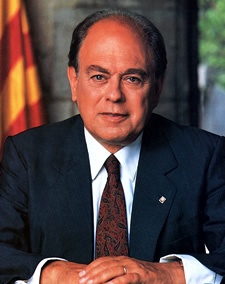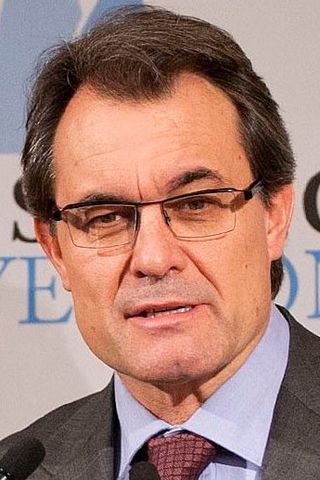
Jordi Pujol Soley is a Catalan politician who was the leader of the party Convergència Democràtica de Catalunya (CDC) from 1974 to 2003, and President of the Generalitat de Catalunya from 1980 to 2003.

Artur Mas i Gavarró is a Catalan politician. He was president of the Government of Catalonia from 2010 to 2015 and acting president from September 2015 to 12 January 2016.

The Catalan independence movement is a social and political movement which seeks the independence of Catalonia from Spain.

The Popular Unity Candidacy is a left-wing to far-left pro-Catalan independence political party active primarily in Catalonia, where it has political representation, but also in other autonomous communities in Spain it considers to be part of the Catalan Countries. The CUP traditionally has focused on municipal politics, and is made up of a series of autonomous candidatures that run in local elections. Its presence is strongest within the borders of Catalonia.
The Statute of Autonomy of Catalonia of 2006 provides Catalonia's basic institutional regulations under the Spanish Constitution of 1978. It defines the rights and obligations of the citizens of Catalonia, the political institutions of the Catalan community, their competences and relations with the rest of Spain, and the financing of the Government of Catalonia.

The Assemblea Nacional Catalana is an organization that seeks the political independence of Catalonia from Spain. It also promotes the independence of other Catalan-speaking regions, which are collectively known as the Catalan Countries.

The 2012 Catalan regional election was held on Sunday, 25 November 2012, to elect the 10th Parliament of the autonomous community of Catalonia. All 135 seats in the Parliament were up for election. It was a snap election, announced on 25 September by President Artur Mas following the pro-independence demonstration in Barcelona on 11 September—the National Day of Catalonia—and the failed talks between President Mas and Prime Minister Mariano Rajoy to give greater fiscal autonomy to Catalonia.

The 2015 Catalan regional election was held on Sunday, 27 September 2015, electing the 11th Parliament of the autonomous community of Catalonia. All 135 seats in the Parliament were up for election. This was the third regional Catalan election in only five years, after the 2010 and 2012 elections and the first one in over 37 years in which Democratic Convergence of Catalonia (CDC) and Democratic Union of Catalonia (UDC) ran separately, after the dissolution of Convergence and Union (CiU) in June 2015 over disagreements on the coalition's separatist turn.

The Declaration on the Sovereignty and Right to Decide of the People of Catalonia was issued on 23 January 2013. The declaration asserted that Catalonia is an autonomous entity and agrees "to initiate the process to exercise the right to decide so that the citizens of Catalonia may decide their collective political future in accordance with the following principles: democratic legitimacy, transparency, dialogue, social cohesion, Europeanism, legality, role of the Catalan Parliament and participation". The declaration was passed with 85 votes in favor, 41 against and 2 abstentions in the Parliament of Catalonia.

The Catalan Way, also known as the Catalan Way towards Independence, was a 400-kilometre (250 mi) human chain in support of Catalan independence from Spain. It was organized by the Assemblea Nacional Catalana (ANC) and supported by 14 nongovernmental groups. It took place in Catalonia on 11 September 2013, which is the National Day of Catalonia, known as Diada. Catalonia's Department of the Interior estimated the number of participants at about 1.6 million. The human chain followed the ancient Via Augusta, from Le Perthus up to Alcanar. According to Carme Forcadell, president of the ANC at that time, it was "a symbol of the unity of Catalan people to achieve national sovereignty".

Irene Rigau i Oliver is a Catalan politician from Spain, born in Banyoles in 1951.

Junts pel Sí was a Catalan electoral, political and parliamentary alliance focused on achieving the independence of Catalonia from Spain. Established ahead of the 2015 Catalan regional election, it was formed by Democratic Convergence of Catalonia (CDC), Republican Left of Catalonia (ERC), Democrats of Catalonia (DC), Left Movement (MES) and Independence Rally (RI.cat), as well as a number of independent personalities from pro-independence sectors of civil society, including the pro-independence organizations Catalan National Assembly, Òmnium and the Association of Municipalities for Independence. The Popular Unity Candidacy (CUP) had been invited to participate in the alliance, but refused to do so and ran on its own instead, citing its disagreement with the presence of politicians in the list.

After pro-independence parties won a majority of seats in the Catalan election on 27 September 2015, the Declaration of the Initiation of the Process of Independence of Catalonia was issued on 9 November 2015. The declaration declares the start of the process to create an independent Catalan state in the form of a republic and proclaims the start of a participative, open, integrating and active citizens' constituent process to lay the foundation for the future Catalan Constitution.
An independence referendum was held on 1 October 2017 in the Spanish autonomous community of Catalonia, passed by the Parliament of Catalonia as the Law on the Referendum on Self-determination of Catalonia and called by the Generalitat de Catalunya. The referendum, known in the Spanish media by the numeronym 1-O, was declared unconstitutional on 7 September 2017 and suspended by the Constitutional Court of Spain after a request from the Spanish government, who declared it a breach of the Spanish Constitution. Additionally, in early September the High Court of Justice of Catalonia had issued orders to the police to try to prevent the illegal referendum, including the detention of various persons responsible for its preparation. Due to alleged irregularities during the voting process, as well as the use of force by the National Police Corps and Civil Guard, international observers invited by the Generalitat declared that the referendum failed to meet the minimum international standards for elections.

National Day for Yes was a gathering in Barcelona on 11 September 2017, the National Day of Catalonia, in support of Catalan independence. It was organized by the Catalan National Assembly (ANC), the main civil society organisations behind the massive pro-independence demonstrations held since 2012.

A constitutional crisis took place in Spain from 2017 to 2018 as the result of a political conflict between the Government of Spain and the Generalitat de Catalunya under the then-President Carles Puigdemont—the government of the autonomous community of Catalonia until 28 October 2017—over the issue of Catalan independence. It started after the law intending to allow the 2017 Catalan independence referendum was denounced by the Spanish government under Prime Minister Mariano Rajoy and subsequently suspended by the Constitutional Court until it ruled on the issue. Some international media outlets have described the events as "one of the worst political crises in modern Spanish history".

The Law on the Referendum on Self-determination of Catalonia, is the name of a Catalan law that governs the holding of the Catalan independence referendum of 1 October 2017, a binding self-determination referendum on the independence of Catalonia.

The Puigdemont Government was the regional government of Catalonia led by President Carles Puigdemont between 2016 and 2017. It was formed in January 2016 after the resignation of Puigdemont's predecessor Artur Mas and it ended in October 2017 with the imposition of direct rule following the Catalan declaration of independence.
Attempts to form a government in Catalonia, and related events, followed the inconclusive Catalan regional election of 27 September 2015, which failed to deliver an overall majority for any political party.

Joan Ignasi Elena i Garcia is a Spanish lawyer and politician from Catalonia, former member of the Parliament of Catalonia and the current Minister of the Interior of Catalonia.

























